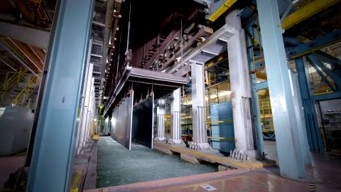Flat Rolled Products
High-Strength Aluminum Alloy Sheets for Aircraft (Quenched Sheets)
- HOME
- Products
- Flat Rolled Products
- High-Strength Aluminum Alloy Sheets for Aircraft (Quenched Sheets)

Use in Aircraft, Rocket Exteriors and Structural Applications
Aircraft, rocket exterior materials and structural materials all require superb strength but must be lightweight. Consequently, a material known as duralimin―a type 2000 alloy with a strength on a par with steel―and type 7000 alloy―which is one of the strongest types of aluminum―are used. The Company uses various facilities and testing equipment, such as a large-scale quenching (heat treatment) furnace and supersonic flaw detector to produce materials that meet the high quality demands of the aerospace industry.
Features
- Aircraft materials are manufactured to strict standards, such as the AS9100 standard, and special process is under stringent management at Nadcap-certified factories.
- Materials are placed in solution in large-scale quenching furnaces, adding fatigue characteristics to the high strength that they gain during heat treating and baking, resulting in high-strength heat treated materials.
- 1230 alloy and 2024 alloy can be combined and surface-polished to create a product that maintains an attractive surface and offers superior strength and corrosion resistance (polished skin sheet).
Regulatory Approval Status
- Acquired AS9100 certification for aircraft materials
- Acquired Nadcap certification related to specialty processes
Certification status of Fukui Works
| Alloys, processes | Applicable regulation |
|---|---|
| 2024 | AMS-QQ-A-250/4 |
| 2024C | AMS-QQ-A-250/5 |
| 7050 | AMS4050 |
| 7075 | AMS-QQ-A-250/12 |
| 7475 | AMS4202 |
| Heat treatment | AMS2750 |
| AMS2772 | |
| Ultrasonic flaw detection | AMS-STD-2154 |
| Nadcap |
Product Size
Size of Typical Aircraft Materials
| By alloy and quality | Typical size (mm) |
|---|---|
| 2024C-T3* | 5×2,390×12,000 |
| 7050-T7451 | 127×1,219×3,658 |
| 7075-T7351 | 102×1,219×3,658 |
- 2024C-T3 is a polished skin sheet.
Fabrication Ranges
Fabrication ranges for aircraft materials (Heat-treated alloy QQA-SPEC)
(mm)
| Sheet, etc. | Maximum width | Maximum length | |||
|---|---|---|---|---|---|
| 2024、2024C-T3、361 | 6061-T5、651 | 7075-T4、T651 | T7451 | ||
| 2.0 – 3.0 | 2,000 | 2,000 | 2,000 | 2,000 | 10,000 |
| – 12.0 | 2,300 | 2,300 | 2,300 | ||
| – 24.0 | 2,700 | 2,700 | 2,000 | ||
| – 46.0 | 3,000 | 3,000 | 2,500 | ||
| – 50.0 | 3,000 | 2,500 | |||
| – 55.0 | 2,700 | 2,200 | 12,000 | ||
| – 60.0 | 2,500 | 2,000 | 1,500 | ||
| – 65.0 | 2,500 | 1,900 | |||
| – 70.0 | 2,300 | 1,750 | |||
| – 75.0 | 2,000 | 1,600 | |||
| – 80.0 | 1,500 | 1,500 | 914 | ||
| – 85.5 | 1,700 | ||||
| – 90.0 | 1,500 | ||||
| – 131.0 | 1,500 | ||||


